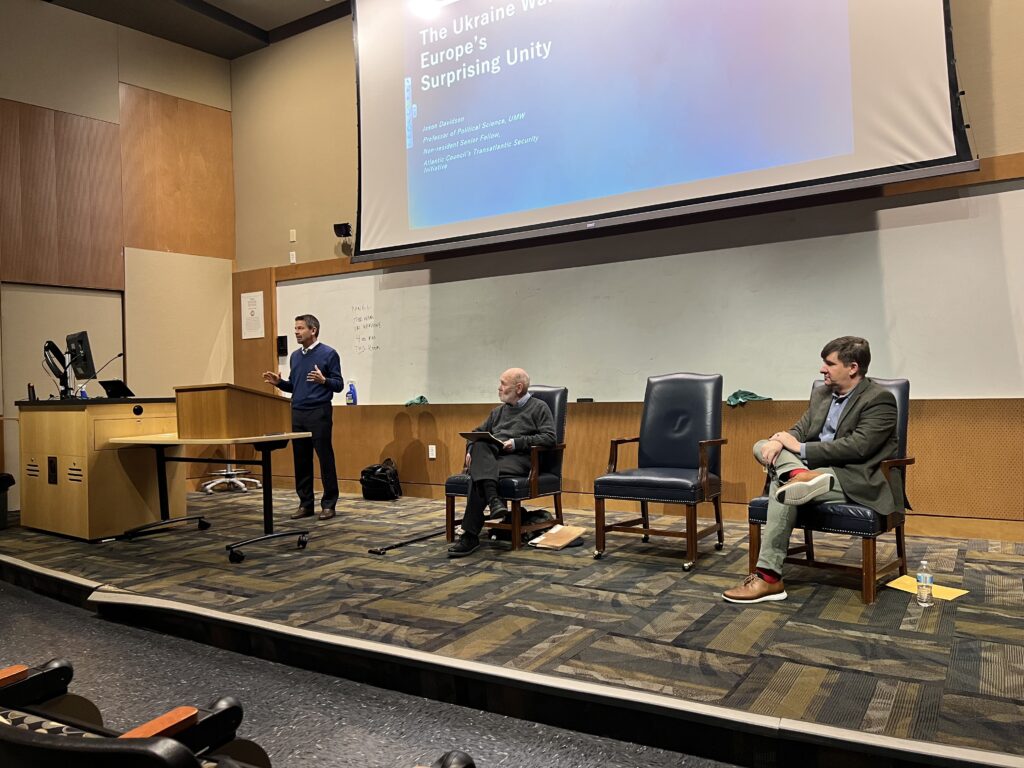Panel discusses war in Ukraine
4 min read
From left to right: panelists Jason Davidson, John Kramer, Arthur Speyer, panelist Kelly Grieco attended via Zoom. | Callie Harkins, The Weekly Ringer
by CALLIE HARKINS
News Editor
UMW’s political science and international affairs department hosted an expert panel discussion on Feb. 20 titled, “The War in Ukraine: One Year On.” The discussion centered around topics such as U.S. policy response, the political scene within Russia, military action taken by both sides and ongoing European security, emphasizing that the war is far from over.
“These events matter, they impact human lives and by all indications, they are not going to stop,” said Jason Davidson, panelist and professor of political science and international affairs at UMW. “The war is not going to stop and the consequences for human life are not going to stop anytime soon.”
The panel was held nearly one year after Russian forces first invaded Ukraine on Feb. 24, 2022. Each panelist was allotted five to ten minutes to discuss the issue within the parameters of their expertise. The group was composed of three UMW faculty members and guest speaker Kelly Grieco, a senior fellow at the Stimson Center, a nonprofit, nonpartisan think tank focused on enhancing international peace and security.
“I think it is important to emphasize that this is the biggest geopolitical crisis in decades,” she said.
Grieco began the discussion by sharing her analysis of the Biden Administration’s foreign policy response.
“The Biden Administration has effectively threaded what is essentially a top policy needle between trying to support Ukraine in its war efforts while also avoiding the dangers of escalation,” she said.
John Kramer, professor emeritus of political science and international affairs at UMW, spoke on the political climate within Russia. Kramer has a doctorate in Soviet area studies and has served as a research fellow for the Russian Research Center at Harvard University.
“What is happening in Ukraine—I think we would all probably agree—has not been a roaring military success for Mr. Putin,” he said.
Kramer discussed the logistics of revolution and possible future opposition to Putin sparked by the war.
“If you get a mass uprising and the potential for an alternative authority figure emerging, either from the masses or within the regime, aligning with the masses, then you have the possibility of an actual revolution,” he said.
Arthur Speyer, an adjunct instructor in the political science and international affairs department and senior analyst at the Marine Corps Intelligence Agency, explained the military action taken by both Russia, Ukraine and NATO members. For the purpose of this panel, Speyer was not representing the Marine Corps and only spoke on behalf of his role as an instructor at UMW.
“We tend to think of wars here as infantry, special operations, ‘happening fast, be quick, get out,’” he said of the U.S. “But that’s not how the Russians operate.”
Speyer spoke on Russia’s willingness to use brute force as means to clear whatever is in its path, whether it be military equipment, or civilians. Because of this, he said, concluding the war will be difficult, especially as Putin becomes more desperate.
“Any type of resolution to this war is not going to be easy,” he said.
Jenny Wolfe, a junior political science major, attended the panel because of her personal interest in international relations and current events.
“My biggest takeaway from what the panelists were discussing is that this is a really strange turn of events,” she said. “No one expected any of this to last more than a few days, and so no one really knows what an end to the conflict looks like or how Russia can come out of this without looking weak.”
While the war is still ongoing, international attention has dwindled. Some students attended the panel in hopes of learning more about the current status of the conflict.
“I attended the event in the hopes of learning more about the current state of the war in Ukraine, especially because it isn’t receiving the amount of attention that it did during the beginning of the conflict,” said Tonia Attie, a freshman political science and philosophy: pre-law double major.
All four panelists concluded that the war is far from over. While Ukraine has surprised international players with its response to Russia, the panelists asserted that the road to resolution is long.
“It’s imperative for all students to keep up with world events, but especially those in the political science and international relations fields,” said Wolfe. “Our world is inextricably interconnected, so as the thinkers and leaders of the future we are tasked with understanding events like this in the hopes that we can be as prepared as possible in the future.”











